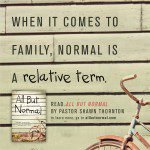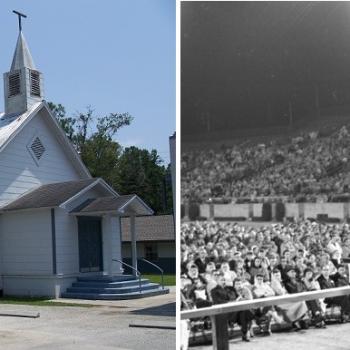by Alec Hill
Twice in the past year, I’ve asked myself this simple question.
The first time followed my diagnosis with bone marrow cancer. Why me? Like others who have been jolted by sudden bad news, I reacted with a singular sense of injustice: Cancer again?… A risky transplant?… But I take better care of my body than most.”
Then I breathed deeply and began to reflect. What undergirds my assumption that I have a right to good health?
Entitlement Attitude
While consciously scorning health-and-wealth theology, I have unwittingly imbibed some of its tenets. This includes a presumption that so long as I obey God and live a decent life, I will be protected from harm.
This sense of divine-human reciprocity – and the entitlements entailed – has great appeal to an indulged boomer like me. But such theology is not only unbiblical, it is also destructive. When major crises occur, erroneous beliefs cause harm. In the rich soil of perceived injustice, seeds of resentment easily bloom into bitterness towards God.
In his book, “Shining Like Stars,” Lindsay Brown recounts a story about Dr. Norman Anderson, an 85-year-old Cambridge professor. After sharing his Christian experience with a student audience, he was asked how he could have such strong faith even though his wife was suffering from dementia and all three of his children had predeceased him.
A student probed: “Don’t you ask yourself ‘why me?’”
Dr. Anderson’s reply was profound: “No. But I do ask the question, ‘why not me?’”
He went on to say that people of faith are not immune to this world’s ills. Like all fallen creatures, we die in airplane crashes, suffer cancer and lose children.
From Genesis 3 onward, it is evident that life will be difficult. Human suffering becomes normative – not only for bad guys – but for saints like Joseph, Job and Jeremiah. Likewise, in the New Testament, Jesus’ path to the cross includes profound pain. His favored discipleship images – slavery, sacrifice and self-dying – grant no entitlements. Disciples in the early church grasped this reality. Who are we to demand otherwise?
Survivor’s Guilt
The second time I asked “why me?” followed my recovery from cancer. Surprisingly, this time the question proved much more difficult.
My diagnosis gave me a 50% chance of survival. Worse, only one-in-five patients with my cancer live without serious health limitations. Eleven months on, I am in that rare 20% category. You would think that I would be thankful – and I truly am – but I am also conflicted.
During my transplant procedure, my wife and I lived in cancer housing for four months. Our next door neighbor, Denny, and I shared the same disease. But our stories could not differ more.
For nine months, he received a series of monthly chemo shots. Each time, his bad white cell count would drop, but then rise again – making him ineligible for a transplant.
So it was a great relief when a donor was identified and a transplant date assigned. However, a few days before the procedure was to occur, he got a simple cold. With a compromised immune system, it spread to his lungs. Unable to fend off the infection, he died.
Meanwhile, I continued to sail through the process. As you can imagine, the juxtaposition of these events – Denny’s death and my good health – created deeply disquieting sentiments.
While I am profoundly grateful for God’s grace in my life, I grieve for Denny’s family. Why am I alive – and thriving – while are others not? My confusion is particularly acute when I see kids with tubes in their noses during my monthly visits to the cancer center.
Anchoring Truths
Even in the midst of this theological fog, I am able to affirm five basic truths.
First, God is not the author of evil. From the beginning, the Lord planned for our shalom and wholeness. Suffering is a result of human rebellion, not divine intent.
Second, the Lord heals. It is evident that He has sovereignly extended both the term and quality of my life. Like the lepers that Jesus restored, my recovery is truly remarkable. He has graciously – and miraculously – intervened to reverse the course of my failing health.
Third, it is right and good for us to lament the suffering of others. Lament, a major biblical tradition in prophetic and wisdom literature, is grossly underutilized in most Western churches today. We must learn more about this ancient practice from our sisters and brothers in the African American church as well as from other parts of the world.
Fourth, while tempted to go beyond lament, we must never accuse the Lord. Like Jeremiah, we must be careful not to harangue the divine potter for that which we – as finite human clay – simply do not understand. Like Job, we must continue to hope in the midst of misery and mystery. This is, I confess, the most difficult aspect of my faith journey.
Finally, we must develop a deep sense of stewardship responsibility towards those who suffer. For me, this particularly means cancer patients, acting on their behalf as friend, servant and advocate. As Jesus said, “to whom much is given, much is required.” By caring for others, our pain is repurposed and our suffering redeemed.
Better Questions
I have come to conclude that asking “why me?” during a crisis is simply the wrong approach. Better are queries such as: what redemptive purpose might be found in this awful situation? How might my character be transformed by this cross-like experience? How might my suffering be channeled to initiate care for others?”
Flipping questions in this manner is not mere pop psychology. Rather, it is obedient discipleship. In a posture of submission and trust, we ask the Father to use us even when we are perplexed and pained.
 Alec Hill is President Emeritus of InterVarsity Christian Fellowship. He is recovering from myelodysplastic syndrome.
Alec Hill is President Emeritus of InterVarsity Christian Fellowship. He is recovering from myelodysplastic syndrome.

















